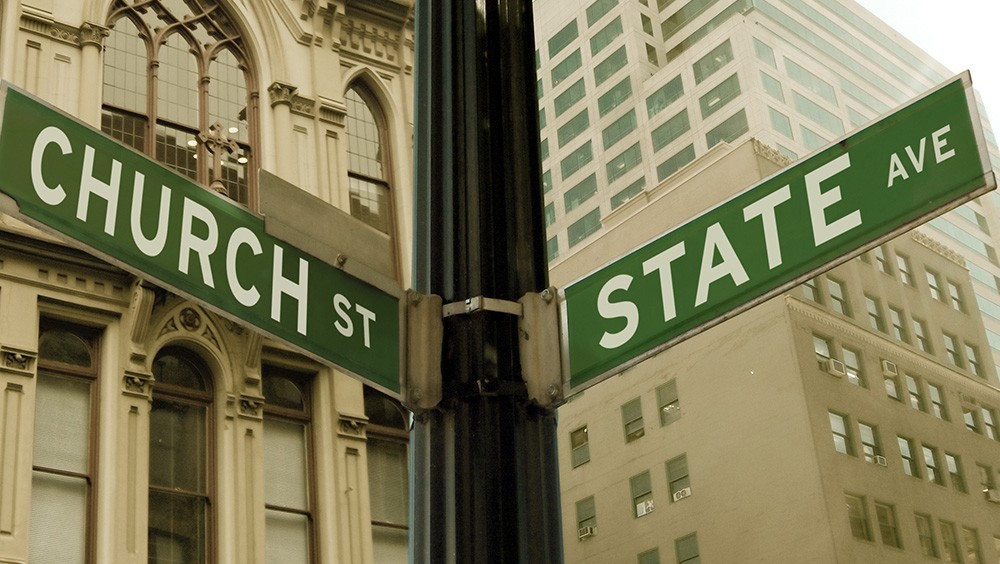- February 11, 2025
Trump’s Disregard for the Separation of Church and State: A Threat to Religious Freedom

The American principle of religious freedom is enshrined in the First Amendment, which ensures that “Congress shall make no law respecting an establishment of religion, or prohibiting the free exercise thereof…” This foundational ideal guarantees that the government remains neutral in matters of faith, neither endorsing nor inhibiting religious practices. However, President Donald Trump has continuously demonstrated a blatant disregard for this core tenet, threatening the separation of church and state in ways that could have lasting consequences for both government institutions and religious organizations alike.
The White House Faith Office: A Dangerous Precedent
On Friday, Trump launched a new White House Faith Office, just one day after signing an executive order purportedly aimed at protecting Christians from discrimination. This office, ostensibly created to “empower faith-based entities, community organizations, and houses of worship,” effectively blurs the constitutional boundary between church and state. The order explicitly encourages religious organizations to compete for federal funding, a move that raises serious concerns about preferential treatment for specific faith groups and the misuse of taxpayer money for religious causes.
At the helm of this initiative is Paula White-Cain, a longtime evangelical adviser to Trump. White-Cain’s appointment signals a clear alignment of the White House with evangelical Christianity, a preference that undermines the religious diversity protected by the Constitution. White-Cain’s public remarks, including her claim that “prayers are being answered and God is moving in America,” reinforce the perception that the administration prioritizes a particular religious ideology over others.
A Manufactured Narrative of Christian Persecution
Trump’s executive order to “eradicate anti-Christian bias” is similarly problematic. The Constitution and existing laws, such as the Civil Rights Act, already provide ample protection against religious discrimination for all faiths, making the creation of a specialized task force to combat anti-Christian bias unnecessary. Moreover, the narrative that Christians face systemic discrimination in the United States is not supported by data. A 2019 Pew Research poll found that 82% of Americans believe Muslims face discrimination, while 64% believe Jews are discriminated against. In contrast, only 50% believe evangelical Christians face discrimination, with just 18% saying they experience significant bias.
Despite these facts, Trump continues to push policies that favor one religious group over others, a clear violation of the principle that the government should remain neutral in matters of faith. The appointment of figures such as Attorney General Pam Bondi to “root out anti-Christian bias” further underscores the administration’s efforts to elevate Christianity above other faiths in official government policy.
The Real Dangers of Government-Backed Religion
The intersection of government and religion is fraught with risks. Historically, when church and state become entangled, both institutions suffer. Religious groups risk becoming political pawns, their spiritual missions compromised by the pursuit of political power and government funding. Meanwhile, government institutions lose their neutrality, alienating citizens of different faiths and undermining the very freedoms they are meant to uphold.
By embedding religious offices within the executive branch and advocating for policies that disproportionately benefit Christians, Trump not only challenges the legal framework that upholds religious freedom but also sets a dangerous precedent for future administrations. If left unchecked, these actions could erode the very foundation of American democracy, where all people—regardless of their faith—are meant to be treated equally under the law.
Defending True Religious Freedom
Religious freedom does not mean government endorsement of any particular faith; rather, it means ensuring that all individuals can practice their beliefs without state interference or favoritism. Trump’s policies subvert this notion, weaponizing religion for political gain and privileging one faith tradition over others. The separation of church and state is not merely a legal technicality; it is a fundamental safeguard that protects both government and religious institutions from corruption and coercion.
As Americans, it is our duty to uphold the true meaning of religious freedom. This means rejecting government-sponsored religious favoritism and ensuring that our leaders respect the constitutional boundaries that protect both faith and democracy. The White House Faith Office and Trump’s broader efforts to dismantle the separation of church and state must be viewed as an existential threat to the freedoms we hold dear—and resisted accordingly.

